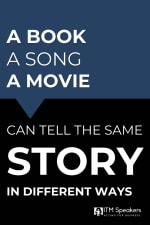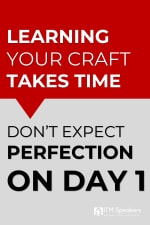 George Orwell wrote the book titled 1984, which inspired Michael Radford to write a screen play, and David Bowie to write a song of the same name based on the same story. The same story told in three different forms of media. In which was it best or at least more effectively, told? It really depends on whether you were sitting in an armchair reading the book, watching the film in a theater, or listening to the radio. I was teaching a class last week and talking about various ways of communicating, but they were all stories. Stories based on objects. Stories based on personal experience. Stories based on structures, themes and commonly known events. The key is finding the right way of telling your story. Here are a few tips: 1. First streamline your story to the base elements to keep it concise so you hit your points well 2. Then, start adding little details to make it more personal and vivid 3. Find the right vehicle to tell your story, for example using a prop, visual, drawing or just telling it with good gestures and voice inflection 4. And, always have a point to make, so create your story at the ending, but tell it from the beginning. People remember good stories and good storytellers. Be memorable.
0 Comments
 We live in a time of instant gratification. Research? Thy name is Google, and it lives in your pocket. It's easy to think that learning a new capability can be achieved through watching a few YouTube videos and reading a blog or two. Malcom Gladwell's book Outliers brought the 10,000 hour rule to a global audience, where it takes that period of practice time to become world-class in a discipline. I think the path for most of us is somewhere in between. You don't need to devote a lifetime to become proficient, but it also won't happen on your first time out. Here are a few tips: 1. Learn what you can, but competency comes from actually performing a skill or activity multiple times until it becomes ingrained. 2. Listen to feedback. It can be from experts who have achieved great skill, or from a friend. All feedback is valuable. 3. Don't think that not being perfect the first time you try something means you won't achieve competency. Everyone scuffs a knee or two early on. |
Categories
All
Robert MattsonRobert is a speaker coach, actor, director, author, speaker, executive and overall marketing guy. He writes about all aspects of presenting and connecting with audiences. Archives
April 2019
|


 RSS Feed
RSS Feed